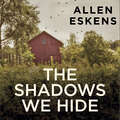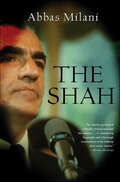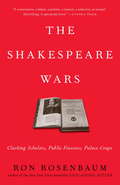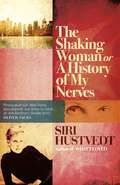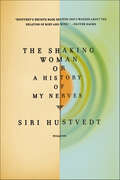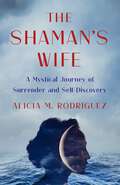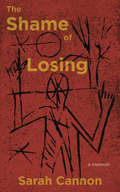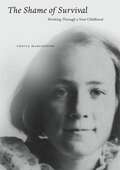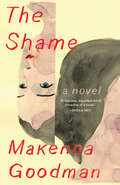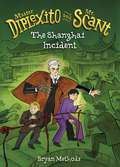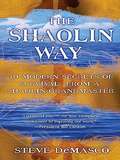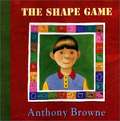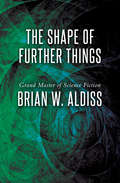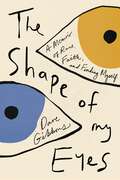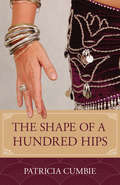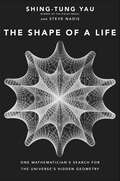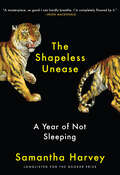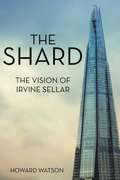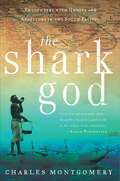- Table View
- List View
The Shadow of the Winter Palace: Russia's Drift to Revolution 1825-1917
by Edward CrankshawA panoramic, illuminating account of a dynasty in decline, that shows how Russia had within it seeds not only of revolution but of many aspects of modern Russia which we think of as peculiar.
The Shadows We Hide
by Allen EskensA young reporter must come to terms with his past - and present - while investigating the murder of a man he believes could be his father.Joe Talbert, Jr. has never once met his namesake. Now out of college, a cub reporter for the Associated Press in Minneapolis, he stumbles across a story describing the murder of a man named Joseph Talbert in a small town in southern Minnesota. Full of curiosity about whether this man might be his father, Joe is shocked to find that none of the town's residents have much to say about the dead man - other than that his death was long overdue. Joe discovers that the dead man was a loathsome lowlife who cheated his neighbors, threatened his daughter, and squandered his wife's inheritance after she, too, passed away - an inheritance that may now be Joe's. Mired in uncertainty and plagued by his own devastated relationship with his mother, who is seeking get back into her son's life, Joe must put together the missing pieces of his family history - before his quest for discovery threatens to put him in a grave of his own.(P) 2018 Hachette Audio
The Shah
by Abbas MilaniThe definitive biography of the last Shah of Iran, tracing his dramatic rise and fall and his role in the creation of the contemporary Islamic Republic. Though his monarchy was toppled in 1979 and he died in 1980, the life of Mohammad-Reza Shah Pahlevi, the last Shah of Iran, continues to resonate today. Here, internationally respected author Abbas Milani gives us the definitive biography, more than ten years in the making, of the monarch who shaped Iran's modern age and with it the contemporary politics of the Middle East.The Shah's was a life filled with contradiction—as a social reformer he built schools, increased equality for women, and greatly reduced the power of the Shia clergy. He made Iran a global power, courting Western leaders from Churchill to Carter, and nationalized his country's many natural resources. But he was deeply conflicted and insecure in his powerful role. Intolerant of political dissent, he was eventually overthrown by the very people whose loyalty he so desperately sought. This comprehensive and gripping account shows us how Iran went from politically moderate monarchy to totalitarian Islamic republic. Milani reveals the complex and sweeping road that would bring the U.S. and Iran to where they are today.
The Shah's Last Ride: The True Story of the Emperor's Dreams and Illusions, Exile and Death at the Hands of His Foes and Friends
by William ShawcrossBiography of the last few years of the Shah's reign.
The Shakespeare Circle
by Stanley Wells Paul Edmondson Edmondson, Paul and Wells, StanleyThis original and enlightening book casts fresh light on Shakespeare by examining the lives of his relatives, friends, fellow-actors, collaborators and patrons both in their own right and in relation to his life. Well-known figures such as Richard Burbage, Ben Jonson and Thomas Middleton are freshly considered; little-known but relevant lives are brought to the fore, and revisionist views are expressed on such matters as Shakespeare's wealth, his family and personal relationships, and his social status. Written by a distinguished team, including some of the foremost biographers, writers and Shakespeare scholars of today, this enthralling volume forms an original contribution to Shakespearian biography and Elizabethan and Jacobean social history. It will interest anyone looking to learn something new about the dramatist and the times in which he lived. A supplementary website offers imagined first-person audio accounts from the featured subjects.
The Shakespeare Stealer
by Gary L. BlackwoodWidge is an orphan with a rare talent for shorthand. His fearsome master has just one demand: steal Shakespeare's play "Hamlet"--or else. Widge has no choice but to follow orders, so he works his way into the heart of the Globe Theatre, where Shakespeare's players perform. As full of twists and turns as a London alleyway, this entertaining novel is rich in period details, colorful characters, villainy, and drama.
The Shakespeare Wars: Clashing Scholars, Public Fiascoes, and Palace Coups
by Ron Rosenbaum"[Ron Rosenbaum] is one of the most original journalists and writers of our time."-David Remnick. In The Shakespeare Wars, Ron Rosenbaum gives readers an unforgettable way of rethinking the greatest works of the human imagination. As he did in his groundbreaking Explaining Hitler, he shakes up much that we thought we understood about a vital subject and renews our sense of excitement and urgency. He gives us a Shakespeare book like no other. Rather than raking over worn-out fragments of biography, Rosenbaum focuses on cutting-edge controversies about the true source of Shakespeare's enchantment and illumination-the astonishing language itself. How best to unlock the secrets of its spell? With quicksilver wit and provocative insight, Rosenbaum takes readers into the midst of fierce battles among the most brilliant Shakespearean scholars and directors over just how to delve deeper into the Shakespearean experience-deeper into the mind of Shakespeare.Was Shakespeare the one-draft wonder of Shakespeare in Love? Or was he rather-as an embattled faction of textual scholars now argues-a different kind of writer entirely: a conscientious reviser of his greatest plays? Must we then revise our way of reading, staging, and interpreting such works as Hamlet and King Lear? Rosenbaum pursues key partisans in these debates from the high tables of Oxford to a Krispy Kreme doughnut shop in a strip mall in the Deep South. He makes ostensibly arcane textual scholarship intensely seductive-and sometimes even explicitly sexual. At an academic "Pleasure Seminar" in Bermuda, for instance, he examines one scholar's quest to find an orgasm in Romeo and Juliet. Rosenbaum shows us great directors as Shakespearean scholars in their own right: We hear Peter Brook-perhaps the most influential Shakespearean director of the past century-disclose his quest for a "secret play" hidden within the Bard's comedies and dramas. We listen to Sir Peter Hall, founder of the Royal Shakespeare Company, as he launches into an impassioned, table-pounding fury while discussing how the means of unleashing the full intensity of Shakespeare's language has been lost-and how to restore it. Rosenbaum's hilarious inside account of "the Great Shakespeare 'Funeral Elegy' Fiasco," a man-versus-computer clash, illustrates the iconic struggle to define what is and isn't "Shakespearean." And he demonstrates the way Shakespearean scholars such as Harold Bloom can become great Shakespearean characters in their own right. The Shakespeare Wars offers a thrilling opportunity to engage with Shakespeare's work at its deepest levels. Like Explaining Hitler, this book is destined to revolutionize the way we think about one of the overwhelming obsessions of our time.
The Shaking Woman or A History of My Nerves
by Siri HustvedtBy the bestselling author of WHAT I LOVED, an intimate and enlightening account of her search for the key to her mysterious nervous disorder, which brilliantly illuminates the connection between mind and body.'Readers of Oliver Sacks will rate this book highly; as with Sacks, scientific knowledge and a powerful capacity for empathy are closely linked . . . It is Hustvedt's gift to write with exemplary clarity of what is by necessity unclear.' HILARY MANTEL, GuardianWhile speaking at a memorial event for her father, the novelist Siri Hustvedt suffered a violent seizure from the neck down. Was it triggered by nerves, emotion - or something else entirely?In this profoundly thought-provoking and revealing book, Hustvedt takes the reader on her journey through psychiatry, philosophy, neuroscience and medical history in search of a diagnosis. Conveying the often frightening mysteries of illness, she illuminates the perennially mysterious connection between mind and body and what we mean by 'I'.
The Shaking Woman, or A History of My Nerves
by Siri HustvedtThe author delves into the mysteries of her own neurological condition in a far-ranging memoir that is “graceful, intense, and curiously affirming” (Booklist).While speaking at a memorial event for her father in 2006, novelist Siri Hustvedt suffered a violent seizure from the neck down. Despite her flapping arms and shaking legs, she continued to speak clearly and was able to finish her speech. It was as if she had suddenly become two people: a calm orator and a shuddering wreck. Then the seizures happened again and again.The Shaking Woman or A History of My Nerves tracks Hustvedt’s search for a diagnosis, one that takes her inside the thought processes of several scientific disciplines, each one of which offers a distinct perspective on her paroxysms but no ready solution. In the process, she finds herself entangled in fundamental questions: What is the relationship between brain and mind? How do we remember? What is the self?In The Shaking Woman, Hustvedt synthesizes her experience and research into a compelling mystery: Who is the shaking woman? In the end, the story she tells becomes, in the words of George Makari, author of Revolution in Mind, “a brilliant illumination for us all.”
The Shaman's Wife: A Mystical Journey of Surrender and Self-Discovery
by Alicia M. RodriguezEmpowering and told from a unique perspective, this globe-spanning memoir of self-discovery and sacrifice has a singular, resounding message for its audience: love is boundless, but it must begin with nurturing oneself.When Alicia Rodriguez, a successful entrepreneur recovering from divorce and loss, accepts an invitation to Ecuador to help a friend who is studying with a shaman, she has no idea how profoundly the decision will change her life&’s course. In Ecuador Alicia meets Napo, a powerful shaman, and they begin an extraordinary relationship that spans two continents and eight years. As their connection deepens, Alicia learns the principles of shamanism and witnesses Napo&’s remarkable healing abilities. Confronted with the illusion of her life in the United States, she decides to move to Ecuador to be with him, and they make plans to build a healing center together on the coast. Within a short time, however, she realizes that she has surrendered her power and agency to Napo, who now wields it as a weapon against her. After years of inner struggle, Alicia finally finds the courage to leave Ecuador and moves to Portugal, where she finds peace . . . until an unexpected phone call rekindles old memories. An extraordinary memoir steeped in spirituality, shamanism, and metaphysics, The Shaman&’s Wife is the story of a woman who, through a daring journey of self-discovery, reclaims and embraces her feminine wisdom—and realizes that love is the answer to her lifelong spiritual quest.
The Shame of Losing: A Memoir
by Sarah Cannon&“A book about the brutal realities of a traumatic brain injury; but it is also about a young mother trying to save her own life. Honest, poetic.&” ―Ann Hedreen, author of Her Beautiful Brain On the morning before Halloween in 2007, Sarah receives a phone call from her husband&’s arborist colleague. Matt, her spouse of seven years and father of their two small children, has been severely injured by a falling tree branch while working in a neighborhood east of Seattle. Visions of their future go dark as she learns to care for the man she depended on for support. Faced with choices about how to behave through this unexpected journey, she takes as many steps back as she does forward and begins a rite of passage she never imagined. The Shame of Losing &“is an unforgettable story of a &‘full-time witness&’ to trauma and its aftershocks. With refreshing candor and a brilliant sense of humor, Sarah takes us through the maze of caring for a loved one who has suffered a traumatic brain injury and reckons deeply with what her own recovery should look like&” (Leigh Stein, author of Self Care). &“A major strength of this memoir is Cannon&’s passionate release of her voice, her shame.&” —Punctuate &“Sarah Cannon&’s memoir navigates trauma&’s juggernaut in a way so compelling the reader witnesses the opening catastrophe first-hand through the lens of her experience . . . With fierce unflinching grit she faces the unrelenting learning her struggle demands and emerges with discerning hard-won clarity. Her courage is palpable and inspires.&” —Joan Fiset, author of Namesake
The Shame of Survival: Working Through a Nazi Childhood
by Ursula MahlendorfWhile we now have a great number of testimonials to the horrors of the Holocaust from survivors of that dark episode of twentieth-century history, rare are the accounts of what growing up in Nazi Germany was like for people who were reared to think of Adolf Hitler as the savior of his country, and rarer still are accounts written from a female perspective. Ursula Mahlendorf, born to a middle-class family in 1929, at the start of the Great Depression, was the daughter of a man who was a member of the SS at the time of his early death in 1935. For a long while during her childhood she was a true believer in Nazism—and a leader in the Hitler Youth herself. This is her vivid and unflinchingly honest account of her indoctrination into Nazism and of her gradual awakening to all the damage that Nazism had done to her country. It reveals why Nazism initially appealed to people from her station in life and how Nazi ideology was inculcated into young people. The book recounts the increasing hardships of life under Nazism as the war progressed and the chaos and turmoil that followed Germany’s defeat.In the first part of this absorbing narrative, we see the young Ursula as she becomes an enthusiastic member of the Hitler Youth and then goes on to a Nazi teacher-training school at fifteen. In the second part, which traces her growing disillusionment with and anger at the Nazi leadership, we follow her story as she flees from the Russian army’s advance in the spring of 1945, works for a time in a hospital caring for the wounded, returns to Silesia when it is under Polish administration, and finally is evacuated to the West, where she begins a new life and pursues her dream of becoming a teacher.In a moving Epilogue, Mahlendorf discloses how she learned to accept and cope emotionally with the shame that haunted her from her childhood allegiance to Nazism and the self-doubts it generated.
The Shame of Survival: Working Through a Nazi Childhood
by Ursula MahlendorfWhile we now have a great number of testimonials to the horrors of the Holocaust from survivors of that dark episode of twentieth-century history, rare are the accounts of what growing up in Nazi Germany was like for people who were reared to think of Adolf Hitler as the savior of his country, and rarer still are accounts written from a female perspective. Ursula Mahlendorf, born to a middle-class family in 1929, at the start of the Great Depression, was the daughter of a man who was a member of the SS at the time of his early death in 1935. For a long while during her childhood she was a true believer in Nazism—and a leader in the Hitler Youth herself. This is her vivid and unflinchingly honest account of her indoctrination into Nazism and of her gradual awakening to all the damage that Nazism had done to her country. It reveals why Nazism initially appealed to people from her station in life and how Nazi ideology was inculcated into young people. The book recounts the increasing hardships of life under Nazism as the war progressed and the chaos and turmoil that followed Germany’s defeat.In the first part of this absorbing narrative, we see the young Ursula as she becomes an enthusiastic member of the Hitler Youth and then goes on to a Nazi teacher-training school at fifteen. In the second part, which traces her growing disillusionment with and anger at the Nazi leadership, we follow her story as she flees from the Russian army’s advance in the spring of 1945, works for a time in a hospital caring for the wounded, returns to Silesia when it is under Polish administration, and finally is evacuated to the West, where she begins a new life and pursues her dream of becoming a teacher.In a moving Epilogue, Mahlendorf discloses how she learned to accept and cope emotionally with the shame that haunted her from her childhood allegiance to Nazism and the self-doubts it generated.
The Shame: A Novel
by Makenna GoodmanA “startlingly original” novel of “recursive loops through the mind of a woman who is breaking down from not making the art she absolutely must make” (Alexander Chee, Paris Review).Alma and her family live close to the land, raising chickens and sheep. While her husband works at a nearby college, she stays home with their young children, cleans, searches for secondhand goods online, and reads books by the women writers she adores. Then, one night, she abruptly leaves it all behind—speeding through the darkness, away from their Vermont homestead, bound for New York.In a series of flashbacks, Alma reveals the circumstances and choices that led to this moment: the joys and claustrophobia of their remote life; her fears and uncertainties about motherhood; the painfully awkward faculty dinners; her feelings of loneliness and failure; and her growing fascination with Celeste, a mysterious ceramicist and self-loving doppelgänger who becomes an obsession for Alma.A fable both blistering and surreal, The Shame is a propulsive, funny, and thought-provoking debut about a woman in isolation, whose mind—fueled by capitalism, motherhood, and the search for meaningful art—attempts to betray her.A Harvard Review Favorite Book of 2020, Selected by Miciah Bay Gault
The Shanghai Incident (Master Diplexito and Mr. Scant #2)
by Bryan MethodsThe pursuit of an international crime syndicate sends British vigilante butler Mr. Scant and his protégé Oliver Diplexito on a globe-hopping trip. After defeating a sinister secret society in Oliver's home country of England, the unlikely pair has arrived in Paris, searching for Mr. Scant's missing niece. What they discover are hints of a conspiracy that leads them all the way to Shanghai, China. Each clue they find only leads to more questions. That is, until Mr. Scant, Oliver, and their allies realize they're the only hope of stopping a plot against China's child emperor.
The Shaolin Way: 10 Modern Secrets of Survival from a Shaolin Kung Fu Grandmaster
by Steve DemascoDeMasco joins monks at the Shaolin Temple and learns their fighting techniques. In the process, he uncovers an ancient philosophy that helps him to learn, grow, and over come his past. In this book, he shares his philosophy and gives ten secrets for survival that will help others to live a more fulfilled life.
The Shape Game
by Anthony BrowneThe author describes how his mother's wish to spend her birthday visiting an art museum with her family changed the course of his life forever.
The Shape of Further Things
by Brian W. AldissThe sci-fi author behind Steven Spielberg&’s A.I. shares his thoughts on the present, the future, and his own work and life. &“We are infinitely rich, yet we mess about with penny-in-the-slot machines,&” writes Brian W. Aldiss in this autobiographical work written over the course of one month. From his Oxfordshire home, he ruminates on dreams, education, the role of technology in our lives, the rise and function of science fiction, and a variety of other topics. The Shape of Further Things is a window into the life and mind of a Science Fiction Grand Master. Winner of two Hugo Awards, one Nebula Award, and named a Grand Master by the Science Fiction Writers of America, Brian W. Aldiss challenged readers&’ minds for over fifty years with literate, thought-provoking, and inventive science fiction. &“This short book flows with large ideas, a time capsule now from the grandest of writers.&” —SF Site
The Shape of My Eyes: A Memoir of Race, Faith, and Finding Myself
by Dave GibbonsA "riveting" and touching memoir about the understanding one's cultural identity from pastor, business leader, and innovator Dave Gibbons (Makoto Fujimura). A surprising diagnosis of PTSD led Dave Gibbons to look to his past for clues to explain the unexpected result. Born to an American soldier and a Korean mother in the wake of the Korean War, Dave has spent his life struggling to blend his Korean roots and his American upbringing. The family joins a conservative church that embraces a strict, rule-based faith, and they try to navigate life as one of the few mixed-raced families in their community. But when tragedy strikes, tearing the family apart, Dave is forced to face long- buried secrets that he can no longer ignore. As he explores his family&’s difficult past, he confronts his own pain and the persistent feelings of not quite fitting in either in America or his mother&’s home country. And when a DNA test ultimately reveals a truth that shatters everything he understood about his history, he is forced to confront the traumas he unknowingly carried.The Shape of My Eyes beautifully weaves historic reference points of the oppression and discrimination against Asian Americans with Dave&’s own personal story. Dave&’s wrestling with belonging in his family, in America, and in the church creates a raw, thought-provoking memoir about race, religion and finding home.
The Shape of a Hundred Hips
by Patricia CumbieOffering an insider's perspective into the world of belly dancing, this text goes beyond the glitz factor of the artform to challenge assumptions people may have about it as suggestive or exotic. The Shape of a Hundred Hips is a memoir that juxtaposes dance and sexual assault recovery that takes the reader into the living room, bedroom, and dance class. It promotes the idea that people can gain insight and take greater control of their lives through intentional movement and artistic connection.
The Shape of a Life: One Mathematician's Search for the Universe's Hidden Geometry
by Shing-Tung Yau Steve NadisA Fields medalist recounts his lifelong effort to uncover the geometric shape—the Calabi-Yau manifold—that may store the hidden dimensions of our universe.Harvard geometer Shing-Tung Yau has provided a mathematical foundation for string theory, offered new insights into black holes, and mathematically demonstrated the stability of our universe. In this autobiography, Yau reflects on his improbable journey to becoming one of the world’s most distinguished mathematicians. Beginning with an impoverished childhood in China and Hong Kong, Yau takes readers through his doctoral studies at Berkeley during the height of the Vietnam War protests, his Fields Medal–winning proof of the Calabi conjecture, his return to China, and his pioneering work in geometric analysis. This new branch of geometry, which Yau built up with his friends and colleagues, has paved the way for solutions to several important and previously intransigent problems.With complicated ideas explained for a broad audience, this book offers not only insights into the life of an eminent mathematician, but also an accessible way to understand advanced and highly abstract concepts in mathematics and theoretical physics.“The remarkable story of one of the world’s most accomplished mathematicians . . . Yau’s personal journey—from escaping China as a youngster, leading a gang outside Hong Kong, becoming captivated by mathematics, to making breakthroughs that thrust him on the world stage—inspires us all with humankind’s irrepressible spirit of discovery.” —Brian Greene, New York Times–bestselling author of The Elegant Universe“An unexpectedly intimate look into a highly accomplished man, his colleagues and friends, the development of a new field of geometric analysis, and a glimpse into a truly uncommon mind.” —The Boston Globe“Engaging, eminently readable. . . . For those with a taste for elegant and largely jargon-free explanations of mathematics, The Shape of a Life promises hours of rewarding reading.” —American Scientist
The Shapeless Unease: A Year of Not Sleeping
by Samantha Harvey&“Sleeplessness gets the Susan Sontag illness-as-metaphor treatment in this pensive, compact, lyrical inquiry into the author&’s nighttime demons.&” —Kirkus Reviews In 2016, Samantha Harvey began to lose sleep. She tried everything to appease her wakefulness: from medication to therapy, changes in her diet to changes in her living arrangements. Nothing seemed to help.The Shapeless Unease is Harvey&’s darkly funny and deeply intelligent anatomy of her insomnia, an immersive interior monologue of a year without one of the most basic human needs. Original and profound, and narrated with a lucid breathlessness, this is a startlingly insightful exploration of memory, writing and influence, death and the will to survive, from &“this generation&’s Virginia Woolf&” (Telegraph).&“Captures the essence of fractious emotions—anxiety, fear, grief, rage—in prose so elegant, so luminous, it practically shines from the page. Harvey is a hugely talented writer, and this is a book to relish.&” —Sarah Waters, New York Times–bestselling author&“Harvey writes with hypnotic power and poetic precision about—well, about everything: grief, pain, memory, family, the night sky, a lake at sunset, what it means to dream and what it means to suffer and survive . . . The big surprise is that this book about &‘shapeless unease&’ is, in the end, a glittering, playful and, yes, joyful celebration of that glorious gift of glorious life.&” —Daily Mail&“What a spectacularly good book. It is so controlled and yet so wild . . . easily one of the truest and best books I&’ve read about what it&’s like to be alive now, in this country.&” —Max Porter, award-winning author of Lanny
The Shard: The Vision of Irvine Sellar
by Howard Watson'We were told we would never get planning consent and we did. We were told we would never be able to fund it and we did. Then we were told we would never be able to build it and we did.' Irvine SellarIn 2000, Irvine Sellar, a former market trader famous for helping to create the look of the Swinging Sixties on Carnaby Street, stood on a rooftop in Southwark, London, and decided to build the tallest building in western Europe. He had virtually no experience, and he wanted to build at the wrong height, in the wrong place, on the wrong side of the river and at the wrong time.Twelve years later, the Shard, a 'vertical city' designed by one of the world's leading architects, Renzo Piano, changed the skyline of London. It immediately became one of the most instantly recognizable and admired contemporary buildings in the world.This is the story of one man's vision for London and his determination to redefine an ancient but maligned part of the city despite seemingly insurmountable challenges including mass opposition, a huge planning inquiry, the financial crash, and major construction issues that required radical improvisation at every turn. At every twist in the tale, Sellar refused to give up.The Shard is a tale of extreme ambition, innovation and a relentless desire to recast the skyscraper as a force for good.
The Shard: The Vision of Irvine Sellar
by Howard Watson'We were told we would never get planning consent and we did. We were told we would never be able to fund it and we did. Then we were told we would never be able to build it and we did.' Irvine SellarIn 2000, Irvine Sellar, a former market trader famous for helping to create the look of the Swinging Sixties on Carnaby Street, stood on a rooftop in Southwark, London, and decided to build the tallest building in western Europe. He had virtually no experience, and he wanted to build at the wrong height, in the wrong place, on the wrong side of the river and at the wrong time.Twelve years later, the Shard, a 'vertical city' designed by one of the world's leading architects, Renzo Piano, changed the skyline of London. It immediately became one of the most instantly recognizable and admired contemporary buildings in the world.This is the story of one man's vision for London and his determination to redefine an ancient but maligned part of the city despite seemingly insurmountable challenges including mass opposition, a huge planning inquiry, the financial crash, and major construction issues that required radical improvisation at every turn. At every twist in the tale, Sellar refused to give up.The Shard is a tale of extreme ambition, innovation and a relentless desire to recast the skyscraper as a force for good.
The Shark God: Encounters with Ghosts and Ancestors in the South Pacific
by Charles MontgomeryWhen Charles Montgomery was ten years old, he stumbled upon the memoirs of his great-grandfather, a seafaring missionary in the South Pacific. Poring over the faint text and faded pictures, he was entranced by the world of black magic and savagery the bishop described, and couldn't help but wonder what drove the Victorian to risk his life among people who had shot, drowned, or clubbed to death so many of his predecessors.Twenty years later and a century after that journey, Montgomery sets out for the reefs and atolls of Melanesia in search of the very spirits and myths the missionaries had sought to destroy. He retraces his ancestor's path through the far-flung islands, exploring the bond between faith and magic, the eerie persistence of the spirit world, and the heavy footprints of Empire. What he discovers is a world of sorcery and shark worship, where the lines between Christian and pagan rituals are as blurred as the frontiers of fact, fantasy, and faith. After confrontations with a bizarre cast of cult leaders, militants, and mystics, the author, in his quest for ancient magic, is led to an island in crisis -- and to a new myth with the power to destroy or to save its people forever.Alternately terrifying, moving, and hilarious, with overtones of Melville and Conrad, The Shark God is Montgomery's extraordinary and piercingly intelligent account of both Melanesia's transformation and his own. This defiantly original blend of history and memoir, anthropology and travel writing, marks the debut of a singular new talent.

